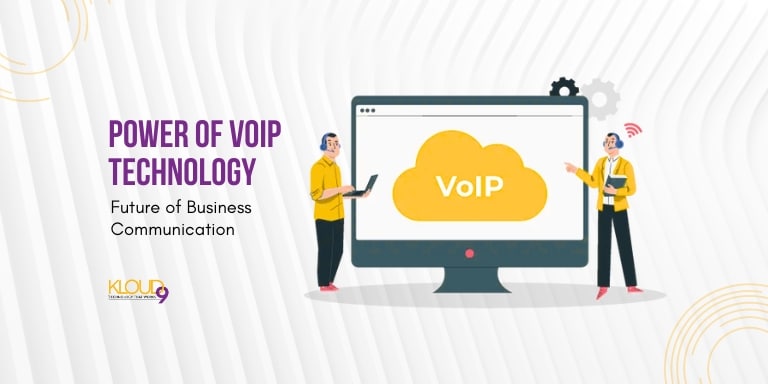In the dynamic landscape of modern business, communication is the cornerstone of success. As technology continues to evolve, traditional methods of communication are gradually being phased out in favor of more efficient and versatile alternatives. One such innovation rapidly reshaping how businesses communicate is voice-over-internet protocol (VoIP) technology. VoIP allows users to make voice calls using the internet rather than traditional telephone lines, offering many benefits propelling it to the forefront of business communication solutions.
Benefits of VoIP Technology
Cost-Efficiency and Scalability
One of the primary advantages of VoIP technology for businesses is its cost-efficiency. Unlike traditional phone systems that require expensive hardware and dedicated phone lines, VoIP operates using existing internet connections, significantly reducing infrastructure costs.
VoIP providers often offer subscription-based pricing models that allow businesses to scale their communication systems according to their needs, whether adding new lines for expanding teams or integrating additional features as the business grows.
This scalability ensures that businesses only pay for their required services, making VoIP an attractive option for startups and established enterprises. Furthermore, the ability to make international calls at lower rates than traditional phone providers can result in substantial savings for businesses with global operations.
Enhanced Flexibility and Mobility
In today's increasingly mobile workforce, flexibility and mobility are paramount. VoIP technology enables employees to communicate seamlessly from anywhere with an internet connection, whether in the office, working remotely, or traveling for business. With features such as softphones, mobile apps, and web-based interfaces, employees can make and receive calls, participate in video conferences, and access voicemail and other communication tools from their smartphones, tablets, or laptops.
This flexibility fosters collaboration and productivity and ensures businesses can maintain uninterrupted communication regardless of geographical barriers or physical office locations. Moreover, VoIP's integration with other business applications such as email, CRM systems, and project management platforms further streamlines workflows and enhances overall efficiency.
Advanced Features and Integration
VoIP technology offers many advanced features beyond traditional phone systems, empowering businesses to communicate more effectively and efficiently. Features such as call forwarding, voicemail-to-email transcription, auto-attendants, and virtual phone numbers enhance communication capabilities while minimizing missed calls and improving customer service. Moreover, integration with other business tools and applications allows seamless workflows and enhanced productivity.
For example, VoIP systems can integrate with customer relationship management (CRM) software to provide agents real-time customer information during calls, enabling personalized interactions and more effective sales and support processes. By leveraging these advanced features and integrations, businesses can gain a competitive edge and deliver superior communication experiences to both internal teams and external stakeholders.
Reliability and Security

Global Connectivity and Collaboration
VoIP technology transcends geographical boundaries, enabling businesses to foster global connectivity and collaboration like never before. International communication often comes with hefty costs and logistical challenges with traditional phone systems. However, VoIP allows for seamless international calls at significantly lower rates, making it easier for businesses to connect with clients, partners, and team members worldwide.
Moreover, video conferencing and screen sharing enhance collaboration by enabling real-time communication and document sharing regardless of participants' locations. This level of global connectivity not only facilitates smoother business operations but also opens up new opportunities for expansion and partnership on a global scale.
Environmental Sustainability
In an era where environmental sustainability is a growing concern, VoIP technology offers tangible benefits such as reducing carbon footprints and promoting eco-friendly practices. Unlike traditional phone systems that rely on physical infrastructure and consume significant amounts of energy, VoIP operates using internet connections, which are generally more energy-efficient.
By leveraging VoIP technology, businesses can reduce the need for hardware components such as desk phones and on-premises servers, thereby minimizing electronic waste and energy consumption. Additionally, the ability to conduct virtual meetings and conferences reduces the need for travel, resulting in lower carbon emissions and environmental impact. As businesses increasingly prioritize sustainability initiatives, VoIP presents an opportunity to align communication practices with broader environmental goals.
Artificial Intelligence and Automation

Moreover, machine learning algorithms can analyze communication data to identify patterns and trends, enabling businesses to optimize workflows, improve customer service, and make data-driven decisions. By harnessing the power of AI and automation, VoIP technology empowers businesses to streamline communication processes, increase productivity, and deliver more personalized experiences to their customers.
Disaster Recovery and Business Continuity
VoIP technology provides businesses with robust disaster recovery and business continuity capabilities, ensuring uninterrupted communication despite unforeseen disruptions. Unlike traditional phone systems that rely on physical infrastructure susceptible to damage from natural disasters or technical failures, VoIP operates in the cloud, offering redundancy and failover options to minimize downtime.
In the event of a power outage or network failure at one location, calls can be seamlessly rerouted to alternate locations or devices, allowing businesses to maintain communication continuity. Additionally, cloud-based VoIP solutions offer automated backup and recovery processes, ensuring critical communication data remains accessible and secure, regardless of external circumstances. By leveraging VoIP for disaster recovery and business continuity, businesses can mitigate risks, minimize operational disruptions, and maintain productivity even in challenging situations.
Wrapping Up
VoIP technology revolutionizes business communication by offering cost-efficiency, scalability, and global connectivity. With advanced features like AI integration and compliance support, VoIP ensures flexibility and reliability while promoting environmental sustainability. Embracing VoIP empowers businesses to thrive in the digital age, fostering innovation and growth.



You must be logged in to post a comment.